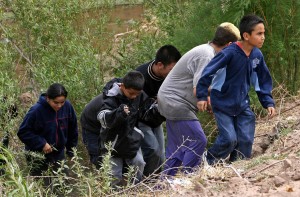
 The surge of immigrants from Mexico and Central America continues to draw attention to the challenges in the Western hemisphere at our borders. Recently, some have suggested that Plan Colombia could offer lessons to address the long-term root causes of violence in the region.
The surge of immigrants from Mexico and Central America continues to draw attention to the challenges in the Western hemisphere at our borders. Recently, some have suggested that Plan Colombia could offer lessons to address the long-term root causes of violence in the region.
Dan Runde of CSIS argued that, “Just as the United States responded to Colombia’s crisis with Plan Colombia, the current crisis requires a multi-decade U.S. commitment to fostering peace and prosperity through development, security, economic, and diplomatic instruments.” Retired General David Petraeus and Michael O’Hanlon argued that Colombia “provides a model for hope as well as a reminder of what is required to make such progress possible.”
But what are the lessons for how a comprehensive approach can be most effective?
Retired Admiral James Stavridis, who commanded U.S. Southern Command during part of Plan Colombia, highlights three elements: the importance of interagency cooperation, public-private partnerships, and tackling corruption.
Southcom’s approach to interagency collaboration is a great example as it supports the civilian agencies working to mitigate violence and corruption in the region. The Bureau for International Narcotics and Law Enforcement Affairs (INL) – an office within the State Department — leads comprehensive programs that assist partners with enhancing their law enforcement capabilities and strengthening rule of law to fight corruption. INL is active around the world in Afghanistan, the Democratic Republic of Congo, Somalia, and Ukraine. These programs include training Afghan and Pakistani border guards to combat drug trafficking and foster synergies with African partners to counter the illegal trade and poaching of wild animals.
INL partners extend to the private sector with companies like PAE, and with local and state law enforcement from 25 states to support training or provide equipment to police forces in Liberia, Lebanon, and Sudan, among other countries. One of those programs uses Creole-speaking New York Police Department officers to train and mentor Haitian police “on community policing, police patrol operations, and investigations” following the 2010 Haiti earthquake. In addition, they work across the government with other agencies, such as Justice and Homeland Security “to provide assistance and technical training to law enforcement, justice sector professionals, and corrections officials.”
USAID also addresses crime and violence prevention programs in the region, focusing on preventing at-risk youth from joining violent gangs and drug cartels, a necessary strategy in tackling corruption. Through a partnership with Tetra Tech, USAID works to help Mexican communities plan and implement community development strategies to provide youth with alternatives to criminal activity, strengthening the capacity of Mexico and countries in this region to overcome their social, economic and security challenges.
In response to the border crisis, U.S. Southern Command commander General John F. Kelly argued that these challenges “cannot be solved by military means alone.” They require an approach that “balances prosperity, governance and security, and funding that has to involve every agency of the U.S. government.”
Calls for a “new Plan Colombia” can sometimes sound like calls for a new Marshall Plan if they do not recognize the significant costs at a time of constrained budgets. They do, however, highlight the need for a comprehensive approach to assist countries reeling from conflict. Admiral Stavridis has suggested these lessons could apply as well to “seemingly intractable problems across the Arab world.” With the many crises facing the United States right now, tackling not just the symptoms but the underlying issues that cause instability will be critical.